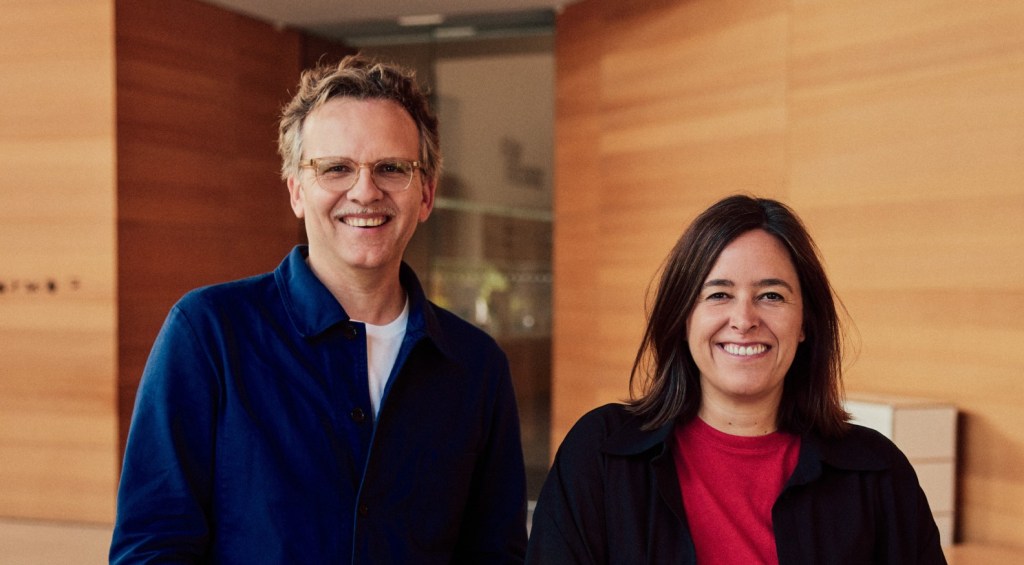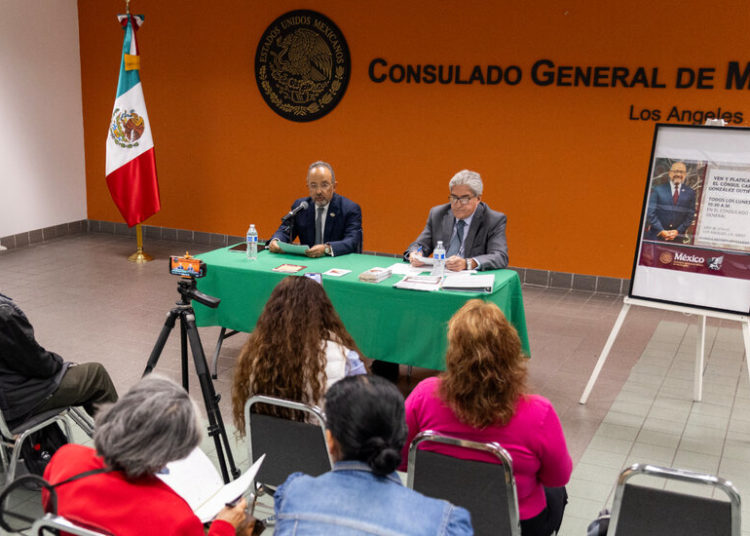It was red hot outside but Munich is a contender for Europe’s most chilled film festival. As the mercury soared, the industry activity at the Munich International Film Festival was, as usual, centered around the Amerikahaus, a cultural institution that fosters transatlantic relations. Festival attendees sought out shady areas in the gardens for al fresco meetings.
Stellan Skarsgård ventured inside to collect his CineMerit Award, while the other recipient of the honor, Gillian Anderson, took to the stage of the Deutsches Theater to receive hers. Their movies – Joachim Trier’s Sentimental Value and Marianne Elliott’s The Salt Path – played at the Festival and other highlights thus far include Elena Oxman’s Outerlands taking the first Queer Media Society award for a feature film. Uta Brieswitz’s American Sweatshop also played at the festival and she gave an industry masterclass, hosted by Deadline, talking about her film and clueing a packed crowd into how to make it in Hollywood.
With the final part of the Festival underway, Artistic Directors Julia Weigl and Christoph Gröner, located a cool spot in the Amerikahaus to give Deadline the low-down on the festival thus far, what’s to come, and their plans for the future.
DEADLINE: Stellan Skarsgård and then Gillian Anderson took your CineMerit Awards this time – and you staged two very different types of ceremony?
JW: We conducted one here at our Festival Center, which is an unusual thing for us to do, and we had a beautiful talk afterwards with Stellan Skarsgård. He was around for three entire days and went to the Q+A of both screenings of Sentimental Value. It’s all about that easy going vibe, it was very much a real festival experience for him. With Gillian Anderson, our second recipient of the CineMerit Award, it had a very classical feel because we did that at Deutsches Theater, our biggest venue. It was a beautiful ceremony with lots of emotions. She cried. We all cried. And after the screening, there was a standing ovation for her and her part in The Salt Path. And that’s just what we want, true emotions.
DEADLINE: How many industry folks are here this time?
CG: There will be the same number of accreditations as last year, around 2,700 people. It’s not necessarily about getting more accreditations. We could have maybe 10% more, but then we would have probably to change this atmosphere of being very familiar and being close together. The quality of the people attending is so high. At the world premiere of I’m Not Stiller, Andreas Bühlmann from Swiss Films said: ‘Wow, I am seeing most of the Swiss film industry here tonight.’ That was proof of concept for us, that we attract ever more people of highest quality from all of the German speaking regions and that is beautiful.
DEADLINE: There is an emphasis on the German-speaking film world, to what extent do you want to build your international audience beyond that?
CG: We’re extremely interested in getting international people and audiences interested in the German industry, so that connection is extremely important to us. And this is also growing year by year. We want to have this mission statement, to be the number one platform for the German film industry. But that, of course, means having them here and having them meet ever more international guests.
JW: It was precisely why we introduced the CineCoPro conference four years ago, and why we brought the CineCoPro Award back. We believe in the future of co-productions and Germany opening up to other countries, especially within Europe, sharing creativity, funding, and collaborating on creative efforts. At the same time, we now have the Creators Conference, organized with the German Producers Alliance, which kicks off the Festival on our warm-up day. It’s a huge asset to talk about the future of producing in Germany, but with international inspiration.
DEADLINE: We can see the industry in Germany, as elsewhere, is facing challenges. You are connected to all of the producers, distributors, sales agents, funders… how do you assess the health of the domestic business?
CG: Within the Festival we would call ourselves cautiously optimistic. As festival organizers we put a lot of work into how we can create a positive mood and use our platform to have the essential discussions. So, on our warm-up day, our very first day before the gala opening, we had the Creators Conference, and also invited the Minister of Culture for the State of Bavaria. He talked to the heads of different companies for the first time about the concept, on a national level, of having new [media] laws. Then, come the opening on Saturday, suddenly, there were various positive messages in terms of: ‘Yes, we have understood the problem. Yes, the situation is not good, but we are really working on it now.’
DEADLINE: Julia, you have been instrumental in the creation of a new industry group that brings together all of the festivals in Germany to share intel and goals. How is that working out?
JW: We are all dependent upon regional funds and that picture is very different depending on where you look in Germany. For example, when we look at the East of Germany, a lot of the cultural funding is being take away. So, having that solidarity between the festivals and to have that lobby working on a national level helps to keep our funding at least visible, it means there is a conversation on a more national level.
DEADLINE: You are in the final stretch. One element left to come are the awards for new talent, is it important so show the next generation of filmmakers out of Germany that love and recognition?
CG: It’s not about only showing the love, it’s also about finding out who is the new Tim Fehlbaum, who’s the new Baran bo Odar, and who is the new Vicky Krieps and Eva Trobish. This is what we’re here for, the new German voices that will shine and collaborate internationally. And this is what we’re gonna see on Friday.
JW: And then, of course, we’re looking forward to our closing film, which is Christian Petzold’s Miroirs No. 3. He’s going to be here and giving a film talk as well. That’s definitely one of the final highlights.
DEADLINE: There is a lot happening here and yet there is a more relaxed vibe than at many festivals. Is that something you cultivate?
CG: Well, we use a lot of frenetic energy so that everybody is relaxed.
The post Munich Film Festival Chiefs Reflect On German Cinema, Stellan Skarsgård’s Star Turn & Gillian Anderson’s Emotional Night: “She Cried, We All Cried” appeared first on Deadline.




